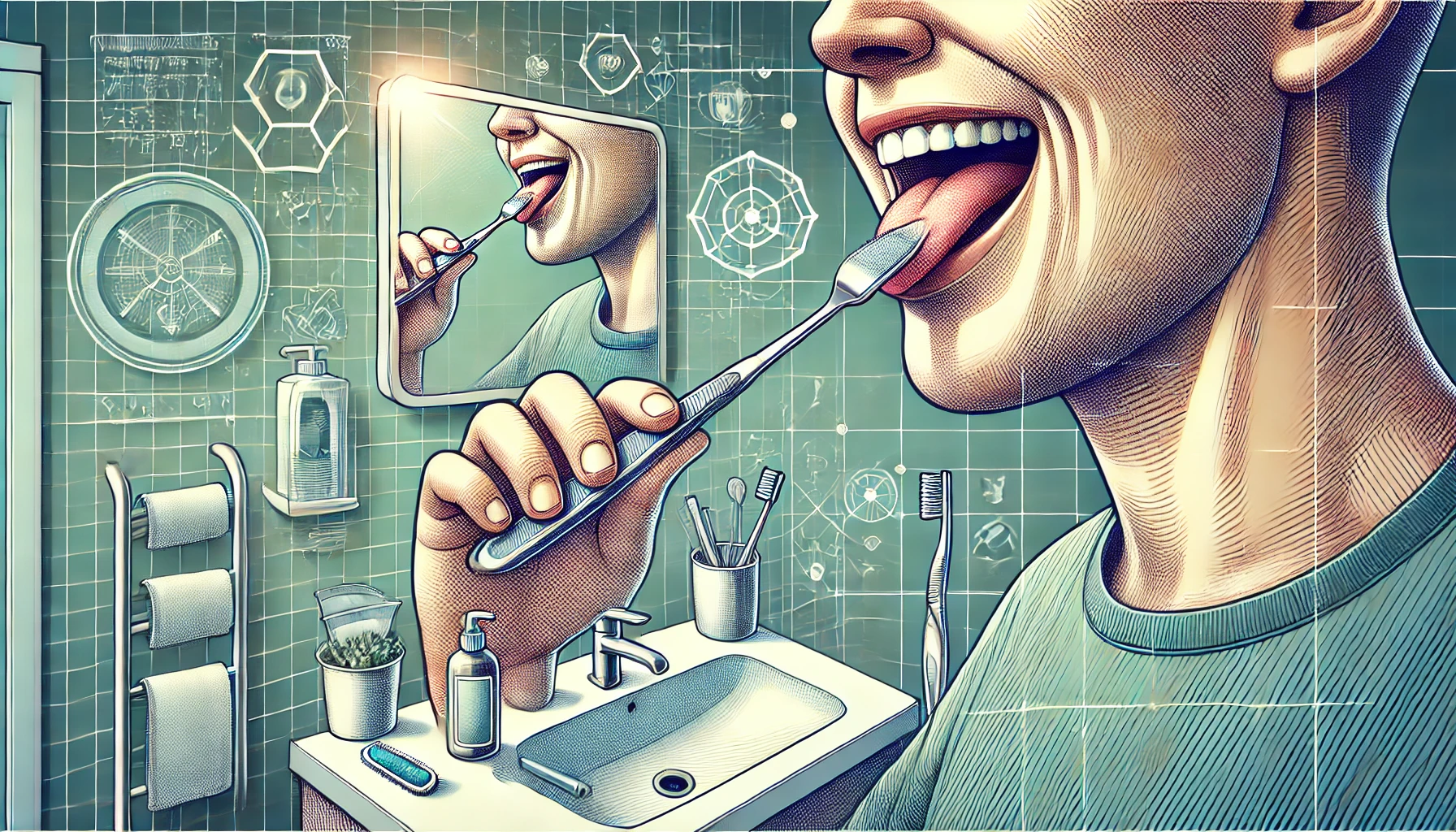When it comes to oral hygiene, most people focus on brushing and flossing their teeth. While these practices are crucial, one often overlooked aspect of maintaining a clean and healthy mouth is tongue scraping, or tongue cleaner. This simple and effective practice of using a tongue scraper can significantly improve your oral health, and if you haven’t already incorporated it into your daily routine, here’s why you should.

What is a Tongue Scraper?
It’s is a tool designed specifically to clean the surface of your tongue (hence, tongue cleaner). It’s usually made from metal or plastic and has a curved edge that allows you to scrape away debris and bacteria from your tongue’s surface. The practice of tongue scraping has roots in ancient Ayurvedic medicine and has been used for centuries to promote oral hygiene.
The Benefits of Using a Tongue Scraper
1. Reduces Bad Breath
Bad breath, or halitosis, is often caused by the accumulation of bacteria, food particles, and dead cells on the tongue. Brushing your teeth alone doesn’t effectively remove these residues. A tongue scraper can help eliminate the buildup on your tongue, significantly reducing bad breath and leaving your mouth feeling fresher.
2. Improves Taste Perception
A clean tongue can enhance your taste buds’ ability to perceive flavors. When your tongue is covered with a layer of debris, it can dull your taste. Regular use can help clear this layer, allowing you to enjoy the full spectrum of tastes in your food and beverages.
3. Promotes Oral Hygiene
Using a tongue scraper helps in reducing the overall bacterial load in your mouth. This can prevent the bacteria from transferring to your teeth and gums, potentially reducing the risk of cavities, gum disease, and other oral health issues. It’s a simple addition to your routine that can have profound effects on your overall oral hygiene.
4. Boosts Immune System
The mouth is the gateway to your digestive and respiratory systems. Keeping it clean can help prevent harmful bacteria from entering these systems and causing infections. By using a tongue scraper, you reduce the chances of bacteria buildup and support your body’s natural defenses.
5. Enhances Appearance of the Tongue
A coated tongue can appear white or yellowish and can be unappealing. Regular scraping can help your tongue look clean and healthy, giving you more confidence in your oral health and appearance.
How to Use a Tongue Scraper
Using one is straightforward and can easily be incorporated into your daily oral hygiene routine. Here’s a step-by-step guide:
- Choose the Right Tongue Scraper: Select a tongue cleaner that feels comfortable and easy to handle. Both metal and plastic scrapers are effective, but metal ones tend to be more durable.
- Rinse the Scraper: Before use, rinse your tongue scraper with warm water to clean it.
- Scrape Your Tongue: Stick out your tongue and place the scraper at the back of your tongue. Gently pull the scraper forward, applying light pressure. Be careful not to press too hard to avoid irritation.
- Rinse and Repeat: Rinse the scraper after each pass and repeat until you’ve covered the entire surface of your tongue. Usually, 5-10 scrapes are sufficient.
- Clean the Scraper: After use, thoroughly rinse your tongue scraper and store it in a clean, dry place.
Tips for Effective Tongue Scraping
- Be Gentle: Your tongue is a sensitive organ. Apply gentle pressure to avoid causing any discomfort or damage.
- Do It Daily: For best results, incorporate tongue scraping into your daily oral hygiene routine, preferably in the morning before eating or drinking.
- Combine with Other Practices: Tongue scraping should complement, not replace, other oral hygiene practices like brushing, flossing, and using mouthwash.
Common Myths About Tongue Scraping
Myth 1: Tongue Scraping is Unnecessary if You Brush Your Tongue
While brushing your tongue with a toothbrush can help, it’s not as effective as using a scraper. The bristles of a toothbrush are not designed to reach the deeper crevices of the tongue, where bacteria and debris can hide.
Myth 2: Tongue Scraping is Painful
When done correctly, tongue scraping should not be painful. Using gentle pressure with the tongue cleaner is key to avoiding any discomfort. If you experience pain, you may be pressing too hard or using an inappropriate technique.
Myth 3: Tongue Scraping Causes Gagging
Some people may initially experience a gag reflex. However, this usually decreases with regular practice as you become accustomed to the sensation. Starting with gentle pressure and gradually working your way further back on your tongue can help reduce gagging.

Choosing the Right Tongue Scraper
When selecting a product, consider the following factors:
- Material: Metal scrapers, such as those made from stainless steel or copper, are durable and easy to clean. Plastic scrapers are also effective and come in various designs and colors.
- Design: Look for a scraper with a comfortable grip and a shape that matches the contour of your tongue. Some scrapers have dual sides for different levels of cleaning intensity.
- Ease of Cleaning: Ensure the scraper is easy to clean and maintain to avoid the buildup of bacteria on the tool itself.
Conclusion
Incorporating a tongue scraper into your daily oral hygiene routine is a simple and effective way to enhance your overall oral health. From reducing bad breath and improving taste perception to promoting better hygiene and boosting your immune system, the benefits of tongue scraping are numerous. This ancient practice is a quick, easy, and inexpensive addition to your routine that can have a significant impact on your oral and overall health. So, why wait? Start using one today and experience the difference for yourself. Your mouth will thank you!


The step-by-step guide on how to use a tongue scraper is practical and easy to follow – thanks. I was a bit embarrassed that I use one but now I think it’s great!